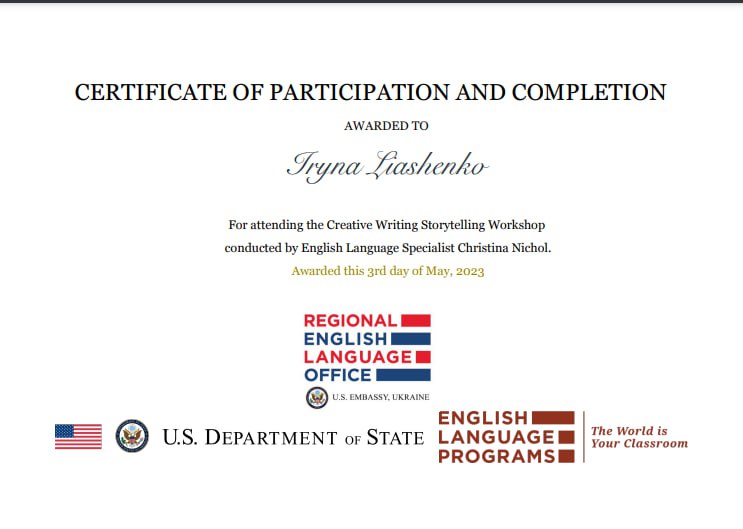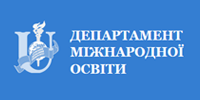The Associate Professor of the Department of Foreign Languages and Linguodidactics Iryna Liashenko completed a course of study from the he Regional English Language Office at the U.S. Embassy Kyiv on Online Institute on Teaching Creative Writing for tertiary teachers of English from Ukraine.
The online course lasted from the summer of last year until May 2023 and aimed to develop the teaching of writing skills and creative writing for university students and beyond. After the war, creative writing is an important tool for students to express their emotions and share their stories with the world.
Creative writing can offer a variety of benefits to second language learners. This can reduce the problem of alignment by focusing on individual expression and personal progress rather than a final standard, and increase motivation, group cohesion, and student autonomy. In addition, it helps develop language at all levels, from grammar to real-life dialogue, and can help with academic writing by developing healthy writing skills, critical thinking, and close reading. Creative writing can also increase students' appreciation and understanding of published stories by bringing play, experimentation, and exploration back into the classroom. Finally, telling personal and fictional stories can reduce stress and aid healing.
The participants of the course gained quite in-depth knowledge of creative writing techniques, strategies for describing the general and details, characters, and emotions, the structure of short stories and memoirs. The course proved the necessity of using creative writing, emphasizing the benefits for students in the development of creativity, and equipped the participants with the necessary teaching methods.
The practical application of teaching creative writing to students has many advantages and can influence the personal and academic development of students. Creative writing helps develop writing skills, including grammar, vocabulary, and discourse. Secondly, it increases the student's motivation, group cohesion, and independence. Third, it helps with academic writing by developing skills in the writing process, critical thinking, and close reading. Fourth, it encourages students to read like writers, which helps them understand the structure of published stories. Fifth, it brings play, experimentation, and exploration back into the classroom, which can help reduce monotony and increase collaboration among students. Finally, telling personal and fictional stories can reduce stress and aid healing, which is especially valuable and relevant in times of war.
Christina Nicol has taught English and creative writing in South Korea, Kosovo, India, and the Republic of Georgia, where her award-winning novel Waiting for the Electricity is set. She currently lives in Northern California and teaches at Sonoma State University.
We congratulate Associate Professor Iryna Liashenko on the successful completion of this program and look forward to the valuable ideas and knowledge she will bring to our department and students.


 eng
eng  укр
укр 






